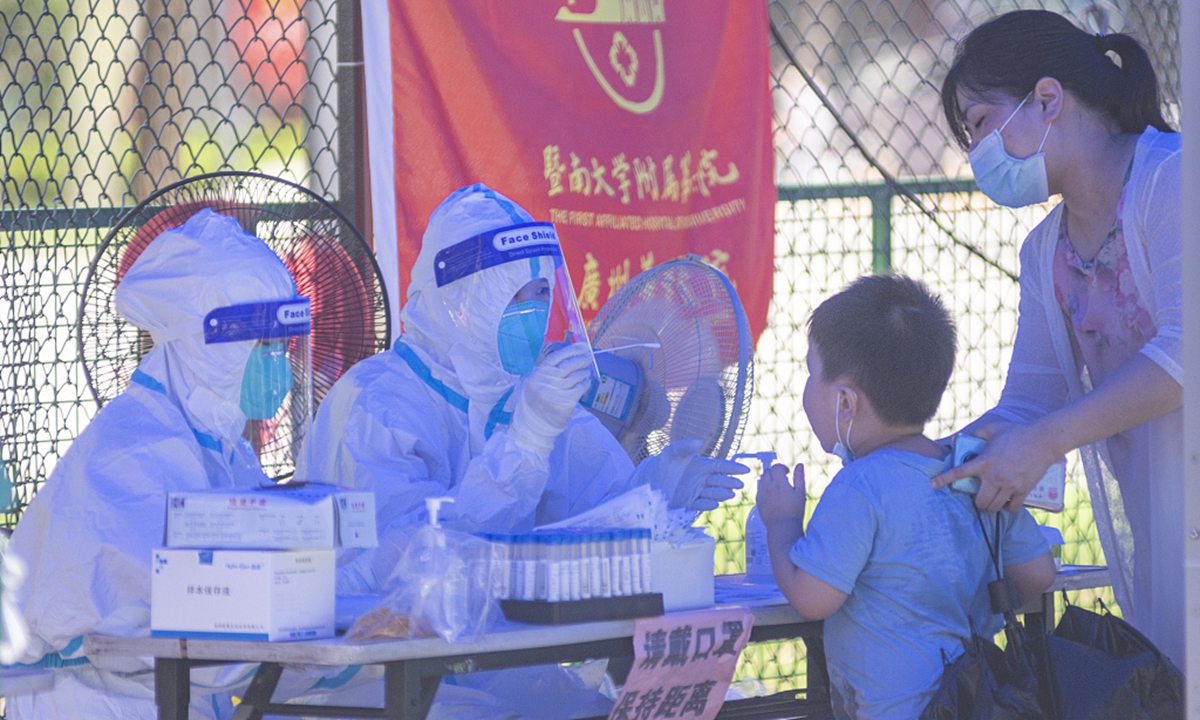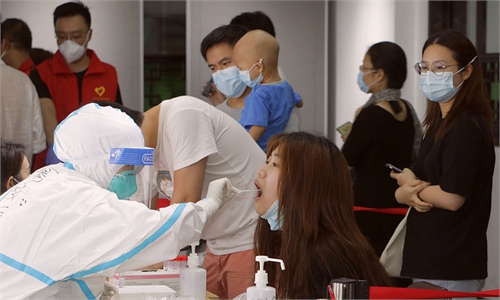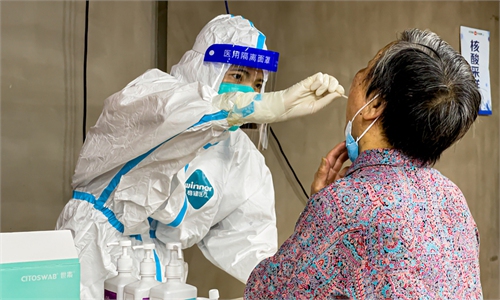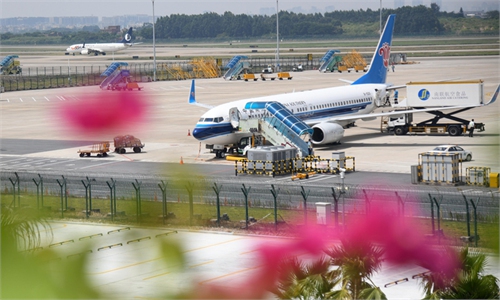Top epidemiologist urges further restrictions as 2nd Guangdong city adopts travel bans

A boy is tested with a nucleic acid test in Foshan, South China’s Guangdong Province on May 30. Photo: VCG
Chinese top epidemiologist Zhong Nanshan has called for "stricter" policies and further restrictions on population flows to contain the epidemic resurgence in South China's Guangdong Province, as Foshan became the second city in the province to issue travel restrictions after Guangzhou on Tuesday.
Zhong suggested that Guangdong should adopt "swifter, stricter and more precise measures" in key areas to contain the resurgence. Guangzhou should further reduce population flows and social gatherings and increase nucleic acid tests so as to cut off the infection chain as soon as possible.
This new outbreak that spread to Guangzhou, Foshan, Maoming and Shenzhen had recorded 62 COVID-19 cases as of the end of Monday during the previous 11 days, data compiled by health authorities showed.
The metropolitan area with Guangzhou as the center, involving Zhaoqing, Qingyuan, Foshan, Yunfu and Shaoguan, is home to more than 37 million residents, reports said.
Foshan, a city neighboring Guangzhou, announced on Tuesday a series of COVID-19 prevention and control measures including stay-at-home orders for residents in some key areas and restrictions on leaving the city without a negative test result.
The city reported two confirmed local cases on Sunday, one on Saturday and one on Friday, official data showed.
Starting at noon on Wednesday, people who wish to leave Foshan should provide negative nucleic acid testing results completed within 72 hours, and those leaving via airports, railway stations and bus stations should also present green health codes, the Foshan government announced on Tuesday.
However, nucleic acid testing sites appeared to be inadequate to meet demand in the city. On January 26, 2021, the Foshan Health Bureau designated 132 medical institutions to carry out testing.
Foshan First People's Hospital can accept 200 appointments per day. But as the latest cases emerged in the city, the number of people coming for testing has "exploded a bit," a medical staffer in the hospital told the Global Times on Tuesday.
The slots run out very quickly every morning these days," the staff member said. "But I'm confident that the epidemic will be brought under control very soon."
A medical staffer in another local hospital also said that the number of people coming for testing was quite high, and people had to wait for one hour or more.
The city's authorities have told public facilities to make strict responses to the new resurgence.
In a hotel in Foshan, a staff member at the front desk told the Global Times on Tuesday that since Friday, the hotel disinfected the facility more times each day.
"We now disinfect the hotel eight times a day," the person said. The hotel has been told by the local government to check the sanitization process and see if its guests and staff have carried out anti-epidemic requirements strictly.
Previously, the capital city of Guangzhou tightened community and travel restrictions in response to mutant strains amid the resurgence.
In a newly released notice on Tuesday, Guangzhou said it sealed off 38 areas. People living in these areas should not step out of their houses.
As of 10 am on Tuesday, Guangzhou Baiyun International Airport had canceled more than 660 flights, accounting for 48.33 percent of the total, according to information from flight data services company VariFlight.
Zhuang Shilihe, a Guangzhou-based immunologist, told the Global Times that this wave of resurgence is likely to be curbed within two weeks.
Experts said that the global average R0 (the number of people a single case can infect in a latent period) is between 2 and 3.2. However, the R0 index in the Guangzhou epidemic has been increasing continuously since May 25 and reached a peak of 6.06 on Saturday. Since Sunday, R0 values declined to 4.19.
This wave of resurgence has led many to question if the current COVID-19 vaccines are effective against the mutated variants, although Chineseexperts have repeatedly said that Chinese vaccine makers are well-prepared to tackle major mutations with the development of new vaccines.
Gao Fu, an academician from the Chinese Academy of Sciences and head of the Chinese Center for Disease Control, recently said that if people who had taken vaccines do get infected with the virus, it seemed that the virus evolves like an influenza virus.
"We probably need to receive jabs against COVID-19 every year, just like how we coexist with influenza," Gao said, adding that when there is an immunity barrier against COVID-19, the regular jabs would be used to prevent critical cases rather than simply avert infections.




